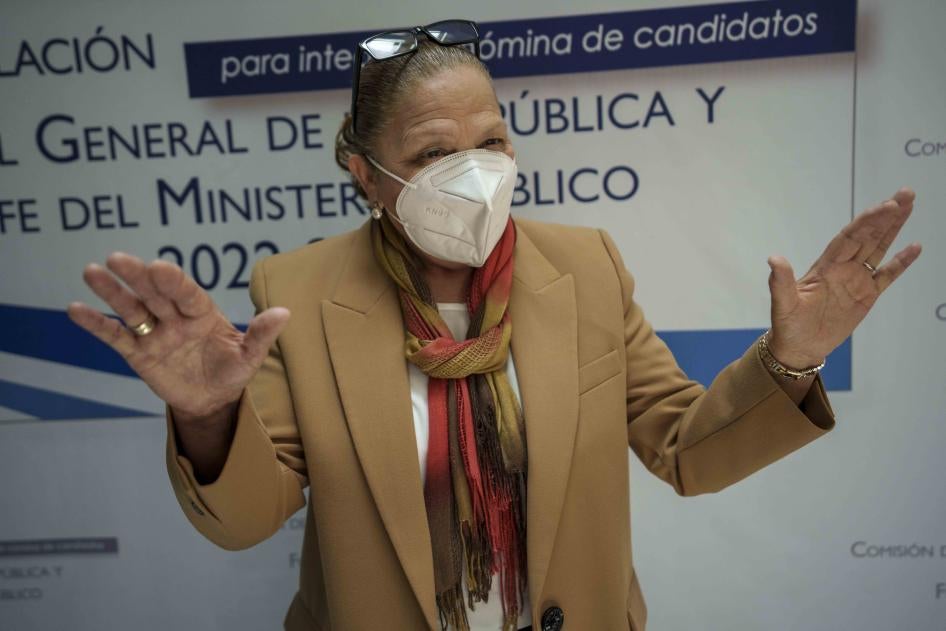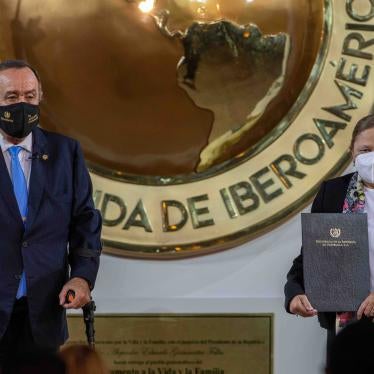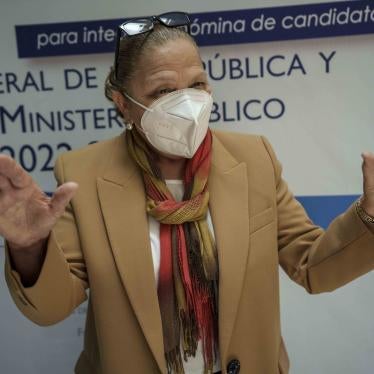(New York) – Guatemalan Attorney General Consuelo Porras’ abrupt removal of eight prosecutors since June 30, 2022 runs counter to international human rights standards and further undermines the independence of prosecutors in the country, Human Rights Watch said today.
The eight prosecutors ousted include Hilda Pineda, who in 2013 took former president Efraín Ríos Montt to trial for “genocide” and “crimes against humanity” for his alleged role in several massacres during the country’s brutal civil war. Eleven administrative officials were also fired. These removals follow the arbitrary ousting and harassment of several independent judges and prosecutors since Porras first took office in 2018.
“The latest removals appear to be part of a broader pattern of abusive transfers, firings, and prosecutions against independent prosecutors and judges in Guatemala,” said Juan Pappier, senior Americas researcher at Human Rights Watch. “Attorney General Porras is undermining the rule of law and leaving all Guatemalans more exposed to unpunished human rights violations and abuses of power.”
Juan Luis Pantaleón, a spokesperson for the Attorney General’s Office, justified the removals saying that, under Guatemalan law, prosecutors are “appoint[ed] based on trust” and therefore can be “freely” named and removed by the attorney general.
The “free” removal of prosecutors by an attorney general has a dubious basis under Guatemalan law, runs counter to international human rights standards, and undermines prosecutors’ ability to conduct their work independently, Human Rights Watch said.
Human Rights Watch reviewed copies of the notifications received by four of the eight fired prosecutors, which are identical and do not include a specific justification for each of their removals.
The notifications cited a 2022 collective bargaining agreement between the Attorney General’s Office and a union that included prosecutors, which describes prosecutors as officials that can be “freely appointed and removed.” The notifications also cited a 2021 Constitutional Court ruling concerning a dispute between the presidency’s social welfare office and one of its workers, which said that collective bargaining agreements should be taken into account when deciding which officials’ appointments should be “based on trust.”
However, the law regulating the Attorney General’s Office under the Guatemalan Constitution indicates that prosecutors are members of the “judicial career” and can only be removed through an appropriate disciplinary process.
Attorney General Porras had previously transferred some of the prosecutors who were removed in what appeared to be arbitrary reassignments to less sensitive areas of work.
In October 2021, the Attorney General’s Office had transferred Pineda, who was then the head of the human rights unit, to an office charged with investigating crimes against tourists, which had little work as the country had few visitors because of the Covid-19 pandemic. The office explained the transfer as part of a supposed strategy for “institutional strengthening.”
The Attorney General also transferred three of the other prosecutors who have been ousted since June 30. Sara Romero was transferred from an organized crime unit to an office charged with dealing with appeals. Wendy Ordóñez was moved from a unit in charge of international cooperation to an office handling crimes against private property. Sara Sandoval was transferred from the unit in charge of recovering assets lost to corruption and other crimes to an office focused on intellectual property crimes.
President Alejandro Giammattei appointed Porras for a second term in May, after a selection process that was marred by several attempts to erode the nominating commission’s independence.
During her initial four years in office, Porras undermined investigations into corruption and human rights abuses, including by transferring or firing the prosecutors in charge. Her office also brought seemingly arbitrary prosecutions against independent judges and prosecutors including Erika Aifán, a judge who had ruled on high-level corruption cases, and Virginia Laparra, a Special Prosecutor’s Office against Impunity (Fiscalía Especial contra la Impunidad, FECI) prosecutor who has been imprisoned since February.
Under international human rights standards, Guatemala should safeguard the independence of its prosecutors. The Inter-American Commission on Human Rights has said that prosecutors should have “special employment stability” and protections to prevent arbitrary removals.
The Inter-American Court of Human Rights had said that prosecutors should only be removed for “legally established causes,” such as the termination of the period for which they were appointed or when they have committed serious disciplinary offenses, following an adequate process to ensure the decision’s impartiality and objectivity.
The UN Guidelines on the Role of Prosecutors provide that prosecutors should have “reasonable conditions of service,” including tenure, and should be able to perform their duties “without intimidation, hindrance, harassment, [or] improper interference.” The UN special rapporteur on the independence of judges and lawyers has said that “the dismissal of prosecutors should be subject to strict requirements, which should not undermine the independent and impartial performance of their activities.”









